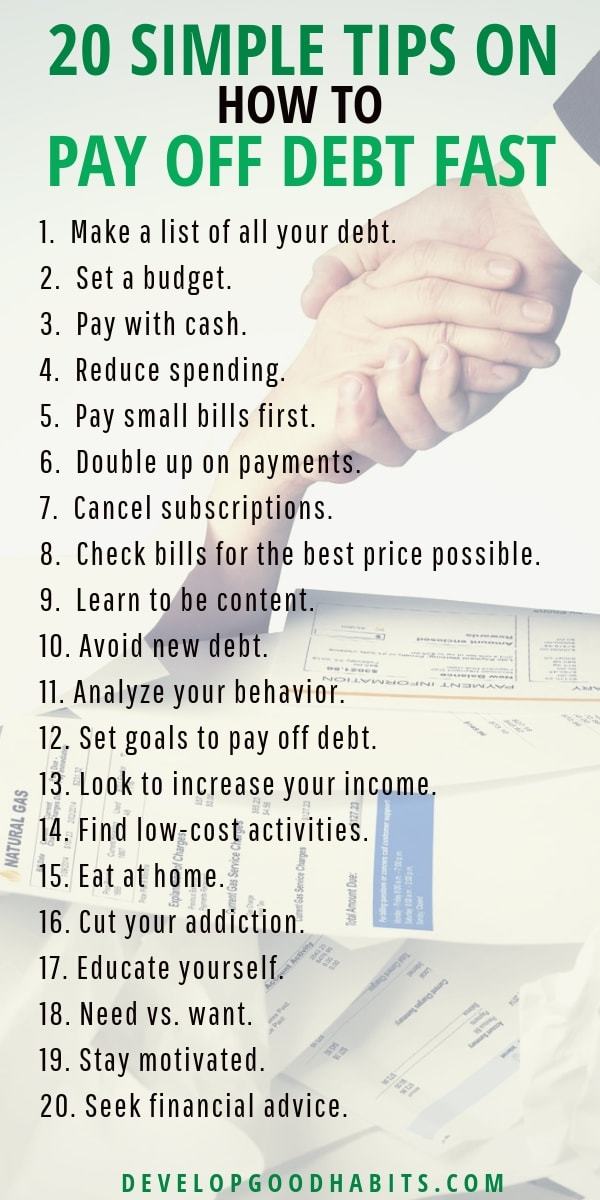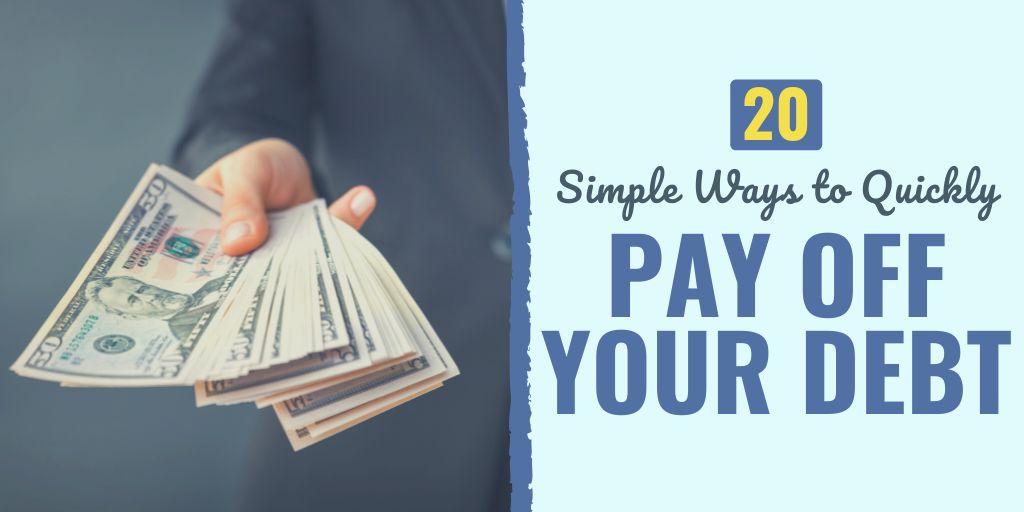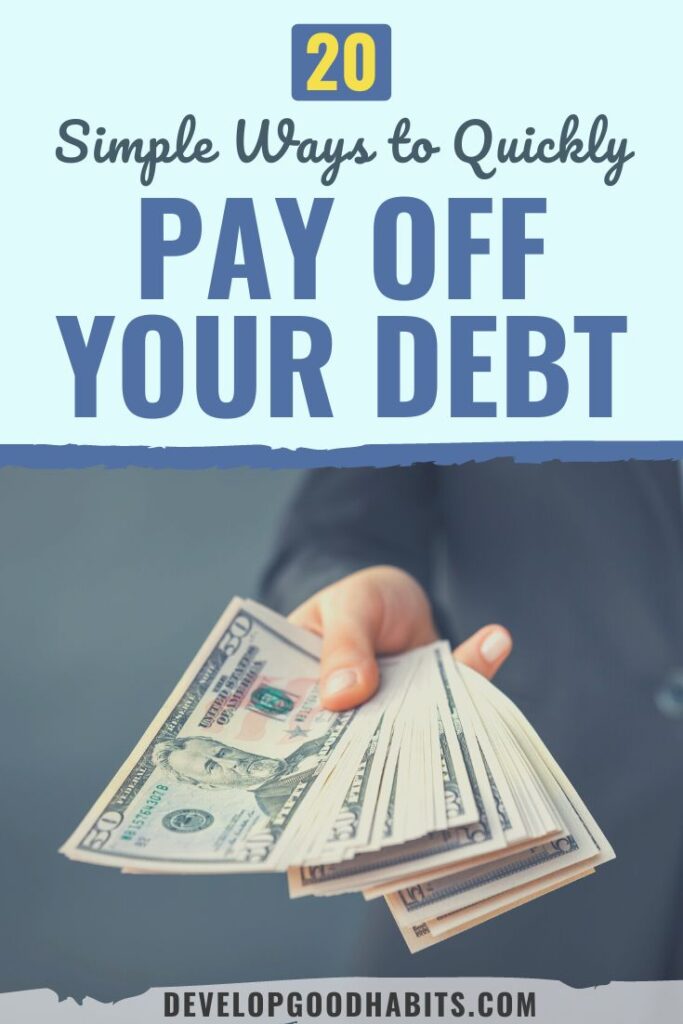Have you ever gone swimming in the ocean and had a huge wave take you down, leaving you seconds to catch your breath before another wave crashed into you?
That’s what being in debt can sometimes feel like.
When in debt, you are:
There are many reasons we fall into debt: failed marriages, student loans, buying a new car, or simply mismanaging money. Whatever the case, there are ways to take control and live debt-free.
In this article, we will explore 20 strategies you can use to get out of debt as quickly as possible.
Following many of these tips will teach you how to pay off debt quickly and be one step closer to financial freedom.
20 Simple Tips on How to Pay Off Debt Fast
1. Make a list of all your debts.
Start with your smallest debt, such as a store credit card, and move to your largest, like your mortgage.
Note which debts can be paid off within months and which could be paid off in a few years. The small debts with the highest percentage fees are the debts that you will want to focus on the most, so you can cross them off of your list and get closer to living debt-free.
Look for debts that you could consolidate to give you one lower monthly payment instead of several different debts to pay off.
Consolidating your bills to pay off multiple debts with a single monthly payment could help you lower your overall monthly bills and reach your savings goals more quickly.

2. Set a budget.
Do you know how to set a budget? There are many ways to do this, but some are more effective. Here is a fail-safe method for setting a budget:
At the beginning of each month, withdraw the cash you have to spend from the bank.
Using labeled envelopes, budget for your spending, including food, clothing, entertainment, and bills. Distribute your cash for the month among your envelopes, and stick to that budget. Once the money is gone from an envelope, that is it for the month for that spending category.
Use Excel to create a spreadsheet to track your monthly spending, and make adjustments as needed. (Check out this post for free budget printables.)
If you are running out of cash for food before the end of the month, consider which envelope you could take some money out of to put into the grocery fund.
This budgeting style, known as the cash-envelope system, has been popularized by financial guru Dave Ramsey. However, my grandmother taught me this simple budgeting method over 40 years ago.
3. Pay with cash.
Working alongside the cash-envelope technique, use cash as your primary payment method. I know this seems strange in our increasingly digital age. But it is harder to part with cash than ones and zeros you never see. Some old ways are best. At least when it comes to your wallet.
When shopping, leave your credit cards at home or destroy them so you are not tempted to use them. Bring with you only the amount of cash that you plan to spend during your errands to prohibit yourself from making impulse purchases.
Use your budget to account for how much you can spend when you go out. This will help you buy only what you need and encourage you to avoid impulse buys so you have money left over for your necessities.
4. Reduce spending.
Review your bank statements every month to identify unnecessary or excessive expenses and see where your money is going. Aside from your bare necessities, does anything stand out?
Maybe you make multiple transactions at your nearest coffee shop each week. To save money, consider substituting these purchases by making coffee at home before leaving the house.
Do you see that you are spending a lot of money on entertainment? Choose to stay in and watch a movie at home rather than going out to the film.
Instead of looking for ways to buy entertainment, spend quality time with your family members. Designate a night as “game night,” or meet up at someone's house and cook dinner together.
Not only will spending time with your family save you money, but it will also be worth more to you in the long run than any entertainment you can purchase.
For the inevitable expenses that appear on your bank statement each month (like the grocery store), start using coupons to buy staple items.
Often, you can join your grocery store's rewards program and use coupons in addition to store savings to get great deals on things that you need.
5. Pay small bills first.
Prioritize your credit cards with the lowest balances because paying them off may give you a lot of psychological satisfaction.
Being able to wipe out a debt in its entirety will allow you to have a small victory of crossing that one off your list and give you momentum to stick with your program.
Once the smaller bills are paid off, you can pay more towards your larger loans. Working your way to your large credit card balances is essential because if they remain unpaid, it can significantly impact your credit score.

6. Double up on payments.
Use any extra money to double up on payments toward a debt. This will help you pay the principal loan amount faster, so you will pay less interest in the long run.
Use your tax refund, money earned from working overtime, birthday money, or any other unexpected money to pay more than the minimum amount due on a loan.
If you can't afford to double your payment, pay as much extra on a loan as possible. Any money you can put directly toward the principal balance will help you ultimately save money.
7. Cancel subscriptions.
Our society's automated nature is really convenient, but you could be spending money on services you don't use. How many “free trials” have you signed up for and forgotten to cancel?
Research has shown that consumers spend over $500 billion yearly on subscription services, but over 70% say they don't use some or most of these services.
If you are not keeping track of your subscriptions, you could be wasting hundreds of dollars each year.
Cancel any automatic renewals linked to your credit card. This will make you consciously decide in the future whether you want to pay for a service or not.
Think about subscriptions like Cable, Netflix, Hulu, Disney +, Apple, and even your gym membership. Consider canceling what you don't use, and add up the total you are spending for the subscriptions you think you want to keep. Once you see what you are spending each month, you may reconsider.
8. Check bills for the best price possible.
Look at your monthly bills and see if you are paying for any extra services you aren't using.
Maybe you are paying for unlimited data on your cell phone but don't use too much data throughout the month. Cutting this and similar expenses can save you money each month without you even noticing.
Also, call your cable and Internet company to see what deals they have going on. They are usually willing to work you into a new contract and save you some money.
You can also talk to them about your cable and Internet usage habits to determine if you are paying for channels or an Internet speed that you don't necessarily need. If not, they may be able to provide you with some extra services at no additional charge.
9. Learn to be content.
When you focus on what you don’t have, you’ll never have enough. Instead, practice gratitude by being thankful for all of the things you do have.
Think about the things you have that make you happy—material items or not—and you will be more likely to be happy with your life.
Work hard towards what you want instead of spending your money on transient trends. This way, you won't experience buyer's remorse when you are still paying down a debt for something you don't use anymore.
Finally, don’t compare yourself to other people. What other people have is not your business, and what you have is not theirs. Focus on meeting your needs and ensuring you are genuinely happy.

10. Avoid new debt.
Don’t get a new loan to pay off your current debt.
In addition to paying loan-origination fees, it’s important to note that while your personal loan interest rate could be lower than your credit card rates, you will be locked into a set monthly payment for a specific amount of time, which could be higher than the minimum payments on your credit cards.
This means you could save money in interest, but your monthly payments may be higher, reducing your monthly cash flow.
Also, avoid signing up for low-interest credit cards that guarantee cashback. While you may get a little bit of cashback each month, you must spend money to make money. These cards aren't worth it in the long run. Instead, pay with cash to avoid racking up credit card debt.
The best new debt to avoid is on a mortgage. Save as much money as you can for a down payment so the monthly payment will be lower when you take out a mortgage. Also, you will likely qualify for a lower interest rate on a mortgage if you put down a more significant sum of money upfront.
Check out our post on financial calculators to see where you stand.
11. Analyze your behavior.
What do your shopping habits look like?
Do you only go shopping when you need something, or do you tend to shop when bored?
When you are out, do you find yourself doing a lot of impulse buying?
Or maybe if you are having a tough day at work, you decide to turn to online shopping to ease your emotions.
Get to know yourself better so that you can change your behavior.
Manage your shopping habits by not shopping on a whim. Don't let your emotions or boredom lead you to spend money on things that you don't need.
Look at what triggers you to spend extra money, and address the root cause.
12. Set goals to pay off debt.
Set a specific date to pay off each of your loans. Mark your calendar and calculate how much and how often you will need to pay it to meet your goal.
Once you hit your goal, reward yourself. Here is a great place to start if you need some motivation while you are paying off your loan.
The time it will take you to become debt-free depends entirely on how much money you can pay toward your debts. The more you pay, the sooner you will be debt-free.
This is where it is important to be reasonable. Having an unrealistic timeline that is impossible to meet can ruin your plan for financial freedom and leave you disappointed and unmotivated to try again. Make sure that the goals you set are realistic for your lifestyle.
If you want to learn more, read our post on SMART financial goals and how to create ones for yourself. Watch the video below for 21 examples of SMART goals:
13. Look to increase your income.
There are a lot of ways you can increase your income these days.
Many people choose to take on second jobs on their own time, such as freelancing, working in direct sales, or having a part-time side hustle.
You can also pick up a night job if you typically only work during the day. If your current place of employment could use some more help, talk to your boss about working overtime to get some more hours in.
Another way to increase your monthly cash flow is to consider getting a roommate or getting on a family plan for your cell phone. You may even consider downsizing your living space if you are paying for a room you don't use.
14. Find low-cost activities.
Rather than breaking the bank on seeing movies at the theater or going out to dinner, look for more reasonable ways to have fun. Check to see what your city offers in terms of free outdoor activities or festivals.
Getting outside and walking is also a great (and healthy) idea. Doing these things with friends can still be fun without spending money every time you leave the house.
Another option is volunteering your time to a cause you feel strongly about. This will not only make you feel good for helping out, but you will also meet like-minded people who are working toward the same goal.
A good hobby will help you stay entertained without spending too much money. Just stay away from expensive hobbies like golfing. If you get good at a hobby (like woodworking) you can even sell some of the things you make as a side hustle).
To help you get started on finding the right hobby, check out these articles:
- 65 Indoor Hobbies for Winter or Inclement Weather
- 25 Social Hobbies to Meet People and Make Connections
- 21 Creative Hobbies to Make Something Great
15. Eat at home.
Instead of going out, eat at home or pack your lunch for work. Not only is eating out expensive, but it is also often unhealthy. When you cook at home, you can control the ingredients and the cost.
A convenient way to eat at home is to meal prep for the week on Sundays. There are even meal planning apps you can use to make this process more convenient.
Plan out your meals and portion your servings so you can grab your lunch on the way out the door in the morning. This will also eliminate the question, “What is for dinner?”
If you plan, you will always know what you are having for dinner, and you will be prepared with the ingredients already in your kitchen. This will not only save you money but also save you time.
16. Cut your addiction.
If you are a smoker or a drinker, if you are used to buying expensive coffee, or if you have any other form of addiction, it is time to cut back.
Smoking and drinking are not only costly, but they are unhealthy and could end up costing you medical bills in the future as well.
When it comes to coffee, it may be a part of your routine to make a quick stop on the way to work to grab a cup—but as you are planning your meals from home, consider planning how you will make your coffee at home as well.
Think about it: If you buy your coffee from a local coffee shop every day, you spend about $20 to $35 a week.
This adds up to almost $2,000 per year. Plus, you are likely paying additional money for food or bakery items while you are there. This is a simple habit to cut that will result in a big reward.
17. Educate yourself.
Learning about investing money can take a while, but the basics are pretty simple, and they never change.
While you were taught basic math in school, too many people enter adulthood without learning the basic money management skills. Skills like investing for the future are critical in the quest for financial freedom.
By learning how to invest your money, you can learn how to make your money make money. Your money can grow while you sleep as long as you have an idea about what you are doing.
Money that is invested wisely earns more money over time. Don’t just turn to a low-interest savings account. Learn to invest in things that will earn you a reasonable amount of money.
Read books on how to avoid debt. Eliminating debt will certainly require patience and discipline, and books can be a very helpful resource when creating a financial plan.
Instead of watching so much television, you can educate yourself about personal finance and money management by reading.
There are many good finance books out there. Here are three to get started with:
- The Budgeting Habit by S.J. Scott and Rebecca Livermore
- Stack Your Savings by S.J. Scott and Rebecca Livermore
- The Psychology of Money by Morgan Housel
18. Differentiate your needs versus your wants.
To analyze what you need versus what you want, you must learn the difference between the two.
A need is anything essential for survival, such as food, water, and shelter.
Everything that is inessential for basic survival, like new shoes or an expensive dress, is generally a want.
These two expenses are very different. Wants to include the things you desire or wish to have. You should focus on fulfilling your needs first because they are clearly important.
A want is never satisfied. It may disguise itself as a need and lead to overspending.
But if you are practical enough to know the difference, you will be able to see that wants are associated with emotions and should be saved for a time when you have the financial freedom to indulge yourself.
19. Stay motivated.
It is important to stay positive when trying to pay off debt quickly. Get creative and make a vision board to help you reach your goals.
A vision board is a poster or bulletin board that you can fill with pictures, quotes, or words that represent your ideal life. You can find pictures in magazines or draw whatever you want.
The point of your vision board is to focus on your primary goals, which has a few benefits. Not only can your vision board help motivate you and keep you positive, it also gives you a fun (and inexpensive!) activity to do at home.
Start a savings account to create a better future for yourself. Watching money accrue in your savings account will keep you motivated to continue saving. Once you have achieved your financial goals, you can take a debt-free vacation!
20. Seek financial advice.
Being in debt can quickly bring you down and even lead to anxiety and depression. Look for free financial advice to get started on working your way out of debt.
Financial planners can advise you on your best opportunities to save, invest, and grow your money. They can also assist in helping you tackle your debt.
When starting, using a planner who charges by the hour is likely your best fit. Hourly planners are usually new and trying to build their practices, which means they will take care to get your financial situation right. This step has to cost you little to no money.
Lastly, talk to your friends. Many of them are likely to be in your situation and may be great people to vent to. They may also have some good tips for saving money and paying off your debt.
Final Thoughts on How to Pay Off Debt
Remember, living with restrictions is only temporary, and everyone goes through it at some point. While the debt may have come fast and easy, it won’t disappear similarly.
Get creative with paying off your loans. The steps listed above are a great way to start, so try out a few of them and see what kind of progress you can make.
Finally, it can be challenging to stay focused on paying off debt. The following articles can help you stay on track.



